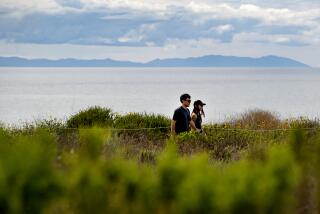Editorial: Food trucks and Amazon deliveries in national parks are a horrific idea
National parks were created more than a century ago to be refuges for flora and fauna and the land on which they depend for existence, to protect them all from the ravages of human development. They have become refuges for humans as well — places where people can disconnect from the clamor of modern society and commune briefly with the natural world while surrounded by spectacular beauty.
To achieve both requires striking a balance between conserving the wildness of the parks and building the infrastructure needed to give humans reasonable access to it. So far, that balance has mostly been maintained in the 58 national parks. But it is now is in danger of toppling, and not in the favor of preservation. President Trump’s Interior Department seems determined to open up the parks to new business and recreational uses, even while it slashes their operational budgets.
President Reagan expressed interest in privatizing and commercializing federal lands in the 1980s, and now Trump is back on the case. Secretary of the Interior David Bernhardt has ordered the National Park Service to allow electric-powered bikes to zip around on park trails, and he is pushing worrisome measures to increase tourism at Yosemite (as if it needed the boost) such as allowing boats on Hetch Hetchy reservoir for the first time.
And further changes have been proposed: Soon, visitors might be able to take a break from strolling under the giant sequoias to stream the latest hot Netflix series, to order the latest electronic gear on Amazon and have it delivered right to their Jumbo Rocks campground (by drone?) or regain their strength after a hike through Badwater Basin in Death Valley at an array of food trucks.
Those are among the actual proposals cooked up by the Outdoor Recreation Advisory Committee, a panel filled with representatives of park concessionaires and other private industries that would profit from these ideas. We might laugh it off as fantasies of avaricious business people (really? Amazon deliveries?) were it not for the fact that it fits into a pattern of efforts by the Trump administration to privatize services provided by federal agencies such as Veterans Affairs and the U.S. Postal Service. The problem is that while privatization might work for some federal endeavors, it is in direct conflict with the raison d’etre of the of national parks. You can’t simultaneously conserve and exploit a natural resource.
The justification given for these “improvements” is to attract the next generation of users. And a case could be made that improving Wi-Fi coverage in the parks would be good for public safety. But it’s insulting to younger people to suggest they won’t be interested in an outdoor experience without all the luxuries and conveniences of home. And it’s not in anyone’s interests to chip away at the very thing that makes the parks worth visiting.
More to Read
A cure for the common opinion
Get thought-provoking perspectives with our weekly newsletter.
You may occasionally receive promotional content from the Los Angeles Times.










